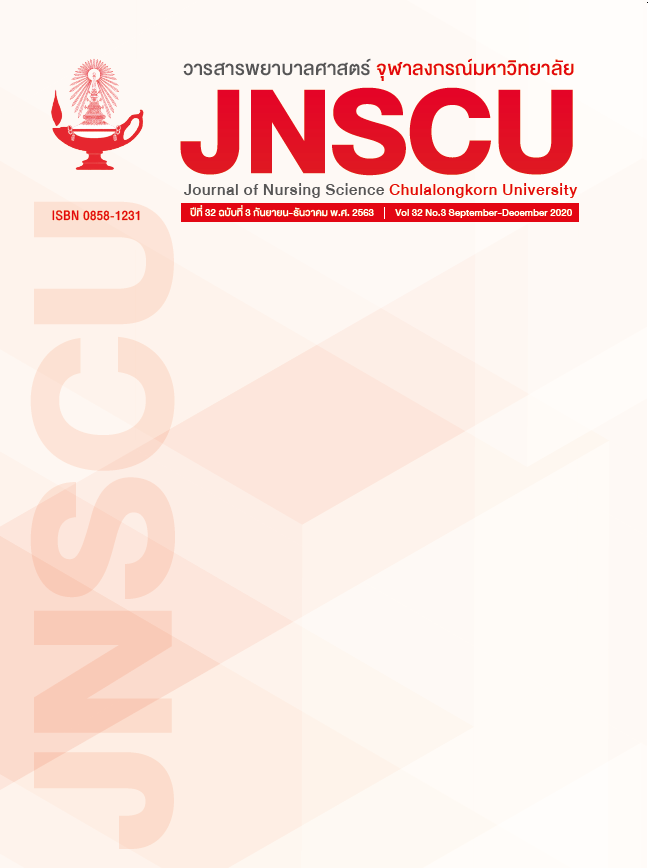ปัจจัยทำนายความรักใคร่ผูกพันระหว่างมารดาและทารก ในหญิงตั้งครรภ์วัยรุ่น
คำสำคัญ:
ความรักใคร่ผูกพันระหว่างมารดาและทารก, หญิงตั้งครรภ์วัยรุ่น, ปัจจัยทำนายบทคัดย่อ
วัตถุประสงค์: เพื่อศึกษาความรักใคร่ผูกพันระหว่างมารดาและทารก และปัจจัยทำนายความรักใคร่ผูกพันระหว่างมารดาและทารกในหญิงตั้งครรภ์วัยรุ่น
แบบแผนการวิจัย: การวิจัยแบบหาความสัมพันธ์เชิงทํานาย
วิธีดำเนินการวิจัย: กลุ่มตัวอย่าง คือ หญิงตั้งครรภ์วัยรุ่นที่มารับบริการฝากครรภ์ ที่แผนกฝากครรภ์ โรงพยาบาลชลบุรี และโรงพยาบาลบางละมุง จำนวน 170 ราย เครื่องมือวิจัยประกอบด้วย 1) แบบสอบถามข้อมูลส่วนบุคคล 2) แบบสอบถามความรักใคร่ผูกพันที่หญิงตั้งครรภ์วัยรุ่นไทยมีต่อทารกในครรภ์ 3) แบบสอบถามสัมพันธภาพระหว่างคู่สมรส 4) แบบสอบถามการถูกกระทำรุนแรงจากคู่สมรส และ 5) แบบสอบถามการสนับสนุนทางสังคม แบบสอบถามที่ 2-5 มีค่าความเชื่อมั่นเท่ากับ .94, .87, .93 และ .82 ตามลำดับ วิเคราะห์ข้อมูลด้วยสถิติเชิงพรรณนา และการวิเคราะห์ถดถอยพหุคูณแบบนำเข้า
ผลการวิจัย: หญิงตั้งครรภ์วัยรุ่นมีความรักใคร่ผูกพันระหว่างมารดาและทารกระดับดี ปัจจัยที่สามารถทำนายความรักใคร่ผูกพันระหว่างมารดาและทารกในหญิงตั้งครรภ์วัยรุ่นได้อย่างมีนัยสำคัญทางสถิติ ได้แก่ สัมพันธภาพระหว่างคู่สมรส การวางแผนการตั้งครรภ์ ประสบการณ์การถูกกระทำรุนแรงจากคู่สมรส อายุครรภ์ และการสนับสนุนทางสังคม โดยปัจจัยทั้งหมดสามารถร่วมกันอธิบายความแปรปรวนของความรักใคร่ผูกพันระหว่างมารดาและทารกในหญิงตั้งครรภ์วัยรุ่นได้ร้อยละ 37.9 (F(5, 164) = 20.046, p < .001)
สรุป: พยาบาลควรนำไปใช้เป็นแนวทางพัฒนารูปแบบการพยาบาล โดยมีการประเมินปัจจัยดังกล่าว และส่งเสริมให้ครอบครัวเข้ามามีส่วนร่วมในการดูแลสนับสนุน เพื่อส่งเสริมความรักใคร่ผูกพันระหว่างมารดาและทารกในหญิงตั้งครรภ์วัยรุ่นให้ดียิ่งขึ้น
ดาวน์โหลด
เผยแพร่แล้ว
ฉบับ
ประเภทบทความ
สัญญาอนุญาต

อนุญาตภายใต้เงื่อนไข Creative Commons Attribution-NonCommercial-NoDerivatives 4.0 International License.
##default.contextSettings.thaijo.licenseTerms##


